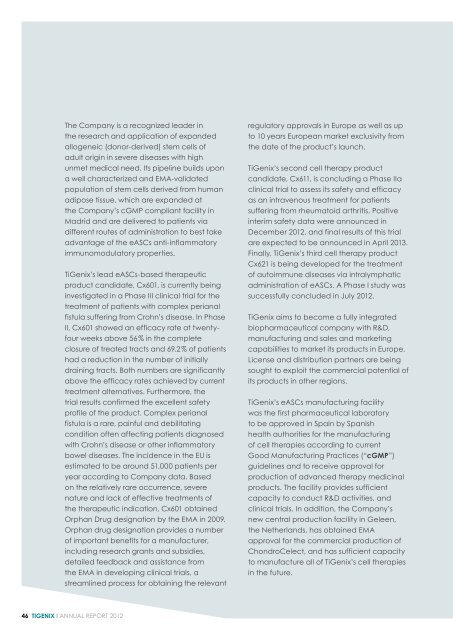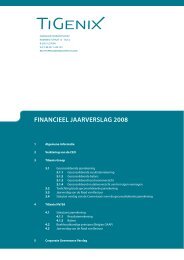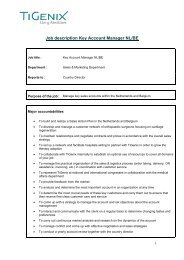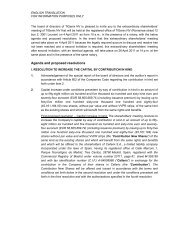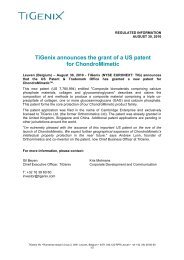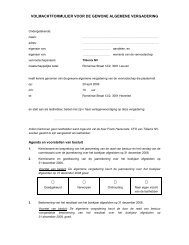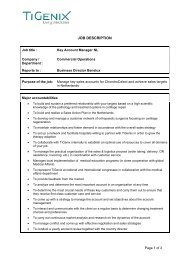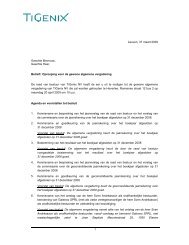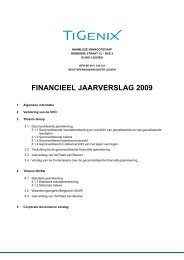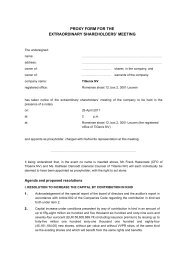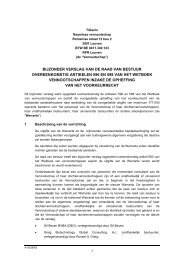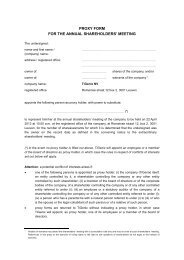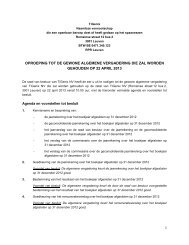ANNUAL REPORT 2012 - TiGenix
ANNUAL REPORT 2012 - TiGenix
ANNUAL REPORT 2012 - TiGenix
You also want an ePaper? Increase the reach of your titles
YUMPU automatically turns print PDFs into web optimized ePapers that Google loves.
The Company is a recognized leader in<br />
the research and application of expanded<br />
allogeneic (donor-derived) stem cells of<br />
adult origin in severe diseases with high<br />
unmet medical need. Its pipeline builds upon<br />
a well characterized and EMA-validated<br />
population of stem cells derived from human<br />
adipose tissue, which are expanded at<br />
the Company’s cGMP compliant facility in<br />
Madrid and are delivered to patients via<br />
different routes of administration to best take<br />
advantage of the eASCs anti-inflammatory<br />
immunomodulatory properties.<br />
<strong>TiGenix</strong>’s lead eASCs-based therapeutic<br />
product candidate, Cx601, is currently being<br />
investigated in a Phase III clinical trial for the<br />
treatment of patients with complex perianal<br />
fistula suffering from Crohn’s disease. In Phase<br />
II, Cx601 showed an efficacy rate at twentyfour<br />
weeks above 56 % in the complete<br />
closure of treated tracts and 69.2 % of patients<br />
had a reduction in the number of initially<br />
draining tracts. Both numbers are significantly<br />
above the efficacy rates achieved by current<br />
treatment alternatives. Furthermore, the<br />
trial results confirmed the excellent safety<br />
profile of the product. Complex perianal<br />
fistula is a rare, painful and debilitating<br />
condition often affecting patients diagnosed<br />
with Crohn’s disease or other inflammatory<br />
bowel diseases. The incidence in the EU is<br />
estimated to be around 51,000 patients per<br />
year according to Company data. Based<br />
on the relatively rare occurrence, severe<br />
nature and lack of effective treatments of<br />
the therapeutic indication, Cx601 obtained<br />
Orphan Drug designation by the EMA in 2009.<br />
Orphan drug designation provides a number<br />
of important benefits for a manufacturer,<br />
including research grants and subsidies,<br />
detailed feedback and assistance from<br />
the EMA in developing clinical trials, a<br />
streamlined process for obtaining the relevant<br />
regulatory approvals in Europe as well as up<br />
to 10 years European market exclusivity from<br />
the date of the product’s launch.<br />
<strong>TiGenix</strong>’s second cell therapy product<br />
candidate, Cx611, is concluding a Phase IIa<br />
clinical trial to assess its safety and efficacy<br />
as an intravenous treatment for patients<br />
suffering from rheumatoid arthritis. Positive<br />
interim safety data were announced in<br />
December <strong>2012</strong>, and final results of this trial<br />
are expected to be announced in April 2013.<br />
Finally, <strong>TiGenix</strong>’s third cell therapy product<br />
Cx621 is being developed for the treatment<br />
of autoimmune diseases via intralymphatic<br />
administration of eASCs. A Phase I study was<br />
successfully concluded in July <strong>2012</strong>.<br />
<strong>TiGenix</strong> aims to become a fully integrated<br />
biopharmaceutical company with R&D,<br />
manufacturing and sales and marketing<br />
capabilities to market its products in Europe.<br />
License and distribution partners are being<br />
sought to exploit the commercial potential of<br />
its products in other regions.<br />
<strong>TiGenix</strong>’s eASCs manufacturing facility<br />
was the first pharmaceutical laboratory<br />
to be approved in Spain by Spanish<br />
health authorities for the manufacturing<br />
of cell therapies according to current<br />
Good Manufacturing Practices (“cGMP”)<br />
guidelines and to receive approval for<br />
production of advanced therapy medicinal<br />
products. The facility provides sufficient<br />
capacity to conduct R&D activities, and<br />
clinical trials. In addition, the Company’s<br />
new central production facility in Geleen,<br />
the Netherlands, has obtained EMA<br />
approval for the commercial production of<br />
ChondroCelect, and has sufficient capacity<br />
to manufacture all of <strong>TiGenix</strong>’s cell therapies<br />
in the future.<br />
46 <strong>TiGenix</strong> I annual report <strong>2012</strong>


